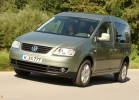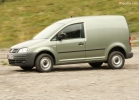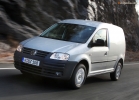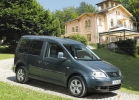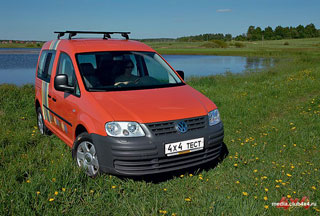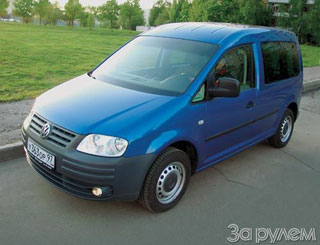Volkswagen Caddy test drive since 2005 Minivan
Above the heel
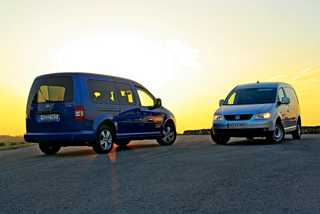 The new Volkswagen-Caddy MAKAKI filled the gap between the compact heel of Kaddie and the spacious transporter. Yuri Nechetov managed to calculate the indicators of the newcomer before meeting him. Photo by the author.
The new Volkswagen-Caddy MAKAKI filled the gap between the compact heel of Kaddie and the spacious transporter. Yuri Nechetov managed to calculate the indicators of the newcomer before meeting him. Photo by the author. Each new generation of cars is greater, more powerful and more expensive than the previous one - there are almost no exceptions to this rule. If the first Volkswagen-Caddy was built on the Polo chassis, then the current (ZR, 2004, No. 7) uses the largest Turan/Golf class platform. In the legendary conveyor, the history of evolution is much longer (ZR, 2007, No. 12), by the fifth generation it is produced by the widest range, and the most severe modifications are several times superior to the founder of the dynasty in basic parameters. At the same time, the characteristics of the two families are overlapping happy: Caddy's carrying capacity reaches 730 kg, and the conveyor begins with 615 kg. It would seem that any buyer will be satisfied, and there is nothing to worry about ...
Liters per kilograms
Upon closer examination, everything is not so simple. The volume of the cargo compartment in the first car is only 2800 liters, while the second is as much as 5800. If you correlate kilograms and liters, we will get even at all how you might think, but the density of a certain ideal load that provides the most effective loading is, respectively, 0.26 and 0.11 kg/l. More than a two -time difference indicates a non -optimal ratio of parameters in these most heavy of the lungs and the lightest of heavy machines of the same purpose.
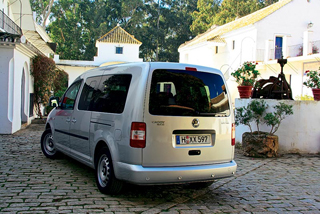 This means that the car that could close the gap between the small heel and the spacious van should be medium, a little more than four cubic meters, and the carrying capacity of about eight centners. This is exactly what the task on the intermediate model looked. Volkswagen designers found a simple and effective solution lengthening Caddy by 470 mm, they built a maxix caddy with the most correct parameters: the body volume is 4200 liters, the maximum carrying capacity of 800 kg, the density of the optimal cargo is 0.19 kg/l. It is curious that these indicators repeat the characteristics of the first conveyor. Such a return to the roots.
This means that the car that could close the gap between the small heel and the spacious van should be medium, a little more than four cubic meters, and the carrying capacity of about eight centners. This is exactly what the task on the intermediate model looked. Volkswagen designers found a simple and effective solution lengthening Caddy by 470 mm, they built a maxix caddy with the most correct parameters: the body volume is 4200 liters, the maximum carrying capacity of 800 kg, the density of the optimal cargo is 0.19 kg/l. It is curious that these indicators repeat the characteristics of the first conveyor. Such a return to the roots. The driver will not notice
The test drive began with embarrassment - having received the keys to the car, jumped behind the wheel and went to the route. Honor and glory to the one who invented the DSG gearbox! Switching, like good hydromechanics, is smooth, without breaking in power flow. At the same time, the connection of the motor and wheels is tough, like that of a robot, but without his characteristic thoughtfulness. And by the speed of switching, it will give a head start, combined, including ordinary mechanics. Having rejected the roads of Andalusia a hundred kilometers and evaluating the dignity of a 1.9-liter turbodiesel with a moment of 250 N. M, put up a car at some beautiful gasyenda and began to click the shutter of the camera. And only then I saw that it was a Volkswagen-Kaddy, and no Maxi Caddy! Okay, it refreshed the impressions ...
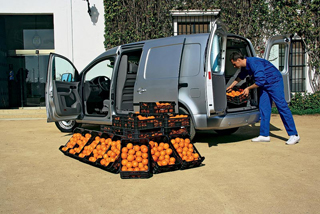 I change the car to the elongated. Unlike most stretchs, in which, for reasons of technological simplicity, only a base or rear overhang is increased, Maxix Caddy is in proportion to both. Thanks to this, the car looks quite harmonious, and only nearby you realize its almost five -meter length. If you do not be clever on the topic of a controlled skid, from the point of view of the driver - the minimum differences, and they mainly boil down to a slightly worse maneuverability.
I change the car to the elongated. Unlike most stretchs, in which, for reasons of technological simplicity, only a base or rear overhang is increased, Maxix Caddy is in proportion to both. Thanks to this, the car looks quite harmonious, and only nearby you realize its almost five -meter length. If you do not be clever on the topic of a controlled skid, from the point of view of the driver - the minimum differences, and they mainly boil down to a slightly worse maneuverability. The owner will appreciate
The two -seater Kaddy Max Van with a four -kubov cargo compartment with a length of 2250 mm (3070 mm without the right front chair) is the largest in the heel class. It looks like it with a Spartan decoration of the salon and the cargo-passenger Caddy Maxi Kombi for five to seven people. The seven-seater Volkswagen-Kaddi MAXICE inside resembles a passenger car, the metal here is closed with plastic panels, there is a shelf above the trunk. The general feature is a huge salon, you don’t get in the inside, but you enter without taking off your hats. Of course, the whole sofa of the third row can be folded or dismantled, and the split (2/1) seat of the second can be folded in parts or completely, which almost compares the freight capabilities of passenger modifications with the van.
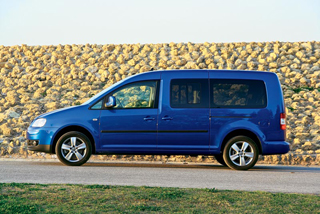 According to the equipment of Caddy, the MAKSI corresponds to the best models of middle classes: even the standard has a good set of adjustments, ABS and Track Control. In the list of options - climate and navigation, stabilization system, rain and light sensors, heating seats and much more, including even electronic differential lock.
According to the equipment of Caddy, the MAKSI corresponds to the best models of middle classes: even the standard has a good set of adjustments, ABS and Track Control. In the list of options - climate and navigation, stabilization system, rain and light sensors, heating seats and much more, including even electronic differential lock. The line of power units, having lost the weakest engines in comparison with the short version, preserved a 1.6 l/102 hp gasoline engine, as well as 1.9 l/105 hp turbodiesel. and the new high -moraine 2.0 l/140 hp.
And at this time in Russia
They were determined with the prices for the Max Caddy. Unfortunately, at the time of preparation of the material there was no clarity, so we will try to estimate them on our own. The cheapest cargo caddy with a 1.4 liter engine costs 12,995 euros (without taxes) in Germany, and in Russia 492 thousand rubles, or 13,670 euro-homework of the machine is 5%. The extended Caddy MAXIC 1.6 L will cost their homeland 15,070 euros, the seven -seater Kombi is more expensive by a thousand, the 1,9 TDI engine is 1,600 euros, for the DSG box another two thousand. Add 5% to these numbers and get approximate Russian prices. However, we assume, and the Volkswagen has
Yuri Nechetov
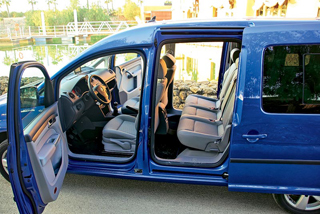
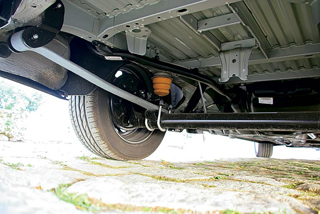
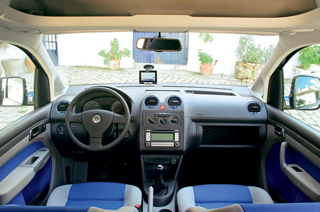
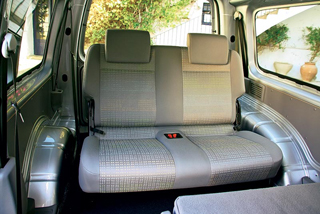
Source: The magazine "Driving"
VOLKSWAGEN CADDY Video Drive Video since 2005
VOLKSWAGEN CADDY Crash Video since 2005
Volkswagen Caddy test drives since 2005
Volkswagen Caddy crash test since 2005
Krassh Test: Detailed Information27%
Driver and passengers
13%
Pedestrians
30%
Children-passengers
Volkswagen Caddy malfunctions since 2005
Volkswagen Caddy malfunctions: Detailed information| Caddy since 2005 | |
|---|---|
| Engine |  |
| Transmission |  |
| Control system and suspension |  |
| Brake system |  |
| Air heating and air conditioning |  |
| Launch and charging system |  |
| Electric components and so on |  |
| Corrosion body stability |  |

